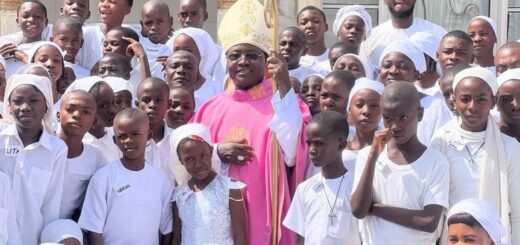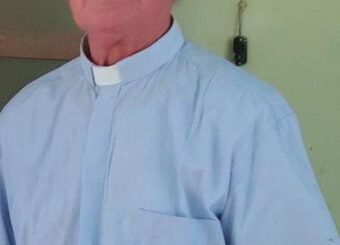LIVING LIVES OF RADICAL GENEROSITY
by ARCH BISHOP · November 10, 2024
32nd Sunday in Ordinary Time, Year B, 2024, St. Peter’s Pastoral Area, Jiwa, Abuja. Homily by Archbishop I. A. Kaigama.
Readings: 1 Kings 17:10-16; Hebrews 9:24-28; Mark 12: 38-44
THEME: LIVING LIVES OF RADICAL GENEROSITY
Dear parishioners of St. Peter’s Pastoral Area, Jiwa, it is good to be with you today. May God keep you all united in doing good works, and may He give you the wisdom to guide you as you continue your journey of faith. I thank your priest-in-charge, Rev. Fr. Francis Uneke, for his good work here. I encourage you, the parishioners, to continue to cooperate with him so that your pastoral area will keep waxing stronger and your faith growing deeper. It is a delight to be with your happy and resilient community today where over 203 of your parishioners will be confirmed and your modest new school and a hall will be blessed. It really shows that your new pastoral area is growing and you have refused to allow the many problems of Nigeria to obstruct your faith.
Today’s readings offer us a deep spiritual insight into the virtues of trust, sacrifice, generosity, and hospitality. We are presented with two inspiring examples of widows from today’s first reading and the Gospel reading, who demonstrated extraordinary generosity through their acts of giving. The widows gave without seeking rewards. We know that a widow, having lost her husband, frequently bears the weight of providing for herself and her family alone. With limited resources, many widows struggle to make ends meet, and this makes it difficult for them to give freely. And yet, these two widows from our readings defied this challenge, showing us that true generosity knows no bounds. Their examples should challenge us.
From our first reading, Prophet Elijah, who lived in a critical time for the northern kingdom where Jezebel introduced idol worship, predicted a three-year drought. This affected the helpless widow in the story with the scarcity of food. She had little but was willing to give even the little she had. For that, she was rewarded with food until the end of the drought.
Despite the dire circumstances of the widow of Zarephath, she selflessly offered her last meal and oil to Elijah the prophet, expecting no recompense. However, God abundantly reward her kindness, miraculously replenishing her supplies. The emphasis here is on the generosity of the poor widow.
The second reading focuses on Christ’s generosity. With trust in His Father, He generously offered himself as “a holy and living sacrifice” (Rom 12:1).
What He offered or lost generously through His suffering and death, He victoriously gained through His Resurrection and Ascension. This was God’s supreme reward to Christ for His supreme generosity. The Catechism of the Catholic Church No. 519 states that “All Christ’s riches ‘are for every individual and are everybody’s property.’ Christ did not live His life for himself but for us men and our salvation.”
The widow of the Gospel gave more than the rich, who only offered part of what is superfluous to them, whereas she gave all that she had to live on (cf. Mk 12: 44). We must learn from this story that God does not measure quantity but quality; He examines the heart; He looks at the purity of intentions. In divine logic or economics, giving generously, even in scarcity, yields unexpected abundance. The widow’s willingness to surrender her meager resources opens the floodgates of divine provision. Her story inspires us to trust God’s promise: “Give, and it will be given to you” (Luke 6:38).
Today, many people struggle with being generous. We often focus on our own needs and accumulate wealth, forgetting the importance of giving. But generosity is not about giving a lot; it is about sharing what we have, no matter how little.
Today, each human being is invited to give. No one is so poor that he or she cannot give something. It is also a call to our leaders to hear the voices and cries of the poor who cry day and night in these tough economic times. They are called not only to give the material things that the constitution has allocated to the citizens but to share it generously, and offer selfless services for the good of the citizens. It is said that if you want to increase, give out things readily.
In Nigeria, where many are facing severe economic hardships, the readings today offer a timely lesson about the nature of true generosity and the value of sacrifice. Nigeria, like the widow in the first reading, is a nation that has been stretched to its limits by very high costs and poverty. The faith of the widows challenges us to trust in God’s ability to provide even in moments of dire need. In a society where many feel helpless and powerless in the face of poverty and hunger, God calls each and everyone, especially our leaders who live large on the resources of the country, to, in the name of human solidarity share equitably the available resources with the most deprived and oppressed in the country, not grudgingly, but willingly. The calls for ordinary Nigerian citizens to sacrifice and wait for better times must not become just a refrain from government quarters.
God wants to know from our leaders not just what they give but what they keep back for themselves. Leaders should know that even when they hide the resources taken illegitimately in the banks in Nigeria or England or America or even stash them in their homes, “The eyes of Lord are in every place, keeping watch on the evil and the good” (Proverbs 15:3). The poor widow in the Gospel would have least imagined that the Saviour would notice her. This shows us how God works in mysterious ways. God takes note of all our secret and hidden actions.
Lessons:
• The scripture Invites us to give particular help and attention to the widows, the orphans, and the strangers.
• In the words of Ann Sophie Swetchine, “We are rich only through what we give [to those in need] and poor only through what we refuse to give” [to them].
• God has given us all we have, so, when He needs them, be it our time, our talents, or our resources, we must not hold back, we must be ready to give it to Him (by giving to the poor).
• God never abandons anyone who trusts in Him. Jesus says, “Give and it will be given to you. A good measure, pressed down, shaken together, running over, will be put into your lap; for the measure you give will be the measure you get back” (Luke 6:38).
• Giving sometimes can be very hard, especially in this our present dispensation. But when you eventually get to give, you will discover that you will be better for it.
• In a country like Nigeria, where so many feel they are at the end of their ropes, many facing hunger, unemployment, and financial hardship, the widow’s faith reminds us that God can work in ways we cannot imagine. What we offer those suffering may seem small, but God can take it and multiply it for them.
• The transformation of Nigeria, much like the transformation of the world, will only happen when we, as individuals are willing to model our lives on Christ’s self-sacrifice, offering not what is convenient, but all that we are, for the good of others.
• The point today is that God does not ask us to give what we do not have. But He does ask us to give what we can, trusting that He will provide. In the face of the economic crisis, fuel scarcity, and inflation that so many Nigerians face, the readings challenge us to trust in God’s ability to provide (through those He has blessed with means), even when all hope seems lost.
May God give us all the spirit of true generosity that we may open our eyes to see the needs of others and reach out to them as best as we can.




